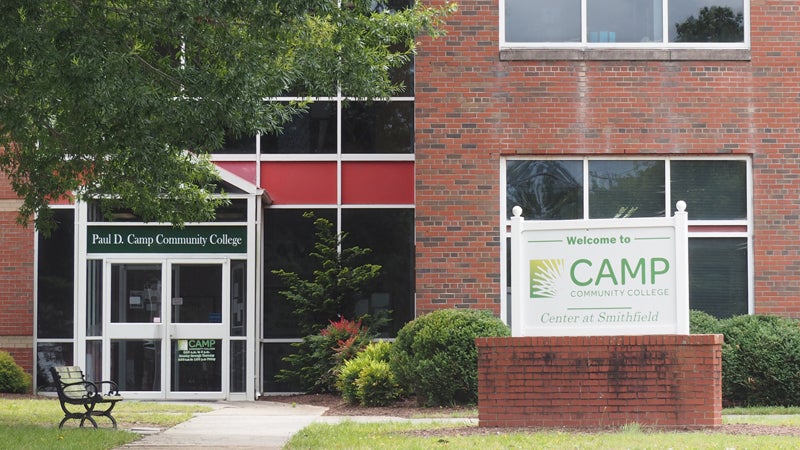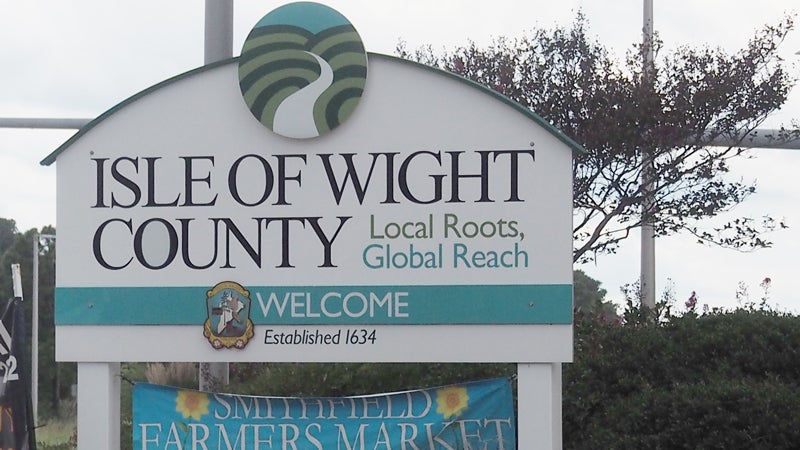Proposed lab school persuades supervisors to renew college’s lease
Published 5:02 pm Monday, September 11, 2023

- The second floor of the old Smithfield High School on James Street has served as the college's Smithfield campus since 1993. (File photo)
Paul D. Camp Community College’s plans to transform its Smithfield campus into a lab school have persuaded Isle of Wight County’s supervisors to continue the college’s lease of the county-owned building.
Since 1993, the county has leased the second floor of the former Smithfield High School on James Street to the college at no cost. The supervisors in June alleged the space to be underutilized and directed County Attorney Bobby Jones to send Paul D. Camp the required one-year notice of intent to terminate the lease.
College President Corey McCray told supervisors on Sept. 7 that Paul D. Camp is planning to submit an application by Oct. 1 to the state for a lab school planning grant for the Smithfield campus.
But before that can happen, “we need to know we have space at the center in Smithfield,” McCray said.
The supervisors responded by voting unanimously to rescind the June 5 notice of termination.
Gov. Glenn Youngkin, since taking office, has touted the lab school concept as offering a K-12 curriculum tailored to meet the needs of a particular community or industry. The state’s 2022 budget included $100 million in grant funding for the creation of “college partnership laboratory schools,” commonly known as lab schools.
Only higher-education institutions can apply to the state to start a lab school, but the idea, according to the Virginia Department of Education, is for the end result to be a partnership among a college, school board and one or more local businesses.
According to McCray, Smithfield’s anchor employer, Smithfield Foods, is “on board” with being the school’s corporate partner, but negotiations continue on the scope of its commitment.
Jim Monroe, Smithfield Foods’ vice president of corporate affairs, described the company’s talks with Paul D. Camp and Isle of Wight County Schools regarding the proposed lab school as “in the very early stages.”
“Our discussions have centered on curriculum as it pertains to potential careers at Smithfield Foods,” Monroe said. “It is premature to speculate on a possible role for Smithfield Foods, but we look forward to staying engaged.”
The Isle of Wight County School Board and supervisors also each verbally committed to supporting the lab school at the Sept. 7 joint meeting of the two governing bodies.
Tara Atkins-Brady, vice president of academic and student development at Paul D. Camp, said the next step is for the college to submit its formal application and develop one or more specific career pathways on which to focus the proposed school’s curriculum. If the concept is approved, the college can then apply for an implementation grant.
According to VDOE, higher-education institutions can receive up to $200,000 for one-time costs associated with developing a lab school concept, such as for hiring paid consultants. Approved lab schools are eligible for start-up grants of up to $1 million to cover one-time costs such as staff recruitment or renovation of classroom space.
“I’m a big advocate for the lab schools,” said School Board Chairman John Collick.
The lab school could also potentially relieve some of the pressure on Isle of Wight County Schools’ in-house career and technical education, or CTE, programs, according to Isle of Wight Superintendent Theo Cramer.
According to Marsha Cale, director of secondary instruction for Isle of Wight County Schools, there were recently 483 applications for 193 seats across the school division’s CTE program. In welding alone, there were 94 applications for 39 seats.
How is the Smithfield campus used now?
Meanwhile, the number of Isle of Wight County students enrolling at Paul D. Camp has been declining since the start of the COVID-19 pandemic, particularly at its Smithfield campus.
Supervisor Dick Grice, who’d urged his fellow supervisors in June to end the college’s lease, had described visiting the Smithfield campus a dozen times over the prior two months and finding it nearly or completely deserted.
According to Atkins-Brady, 30 in-person courses scheduled on the Smithfield campus saw sufficient enrollment to be taught in 2018. As of the start of the fall 2023 semester, that number had fallen to just nine. But the campus is far from defunct, she contends.
Among those still taught in-person a crane operator certification course, which has seen four enrollees since starting in April. According to Atkins-Brady, Paul D. Camp is the first community college in the state to offer the three-week crane operator course, which consists of 40 hours of classroom instruction at the Smithfield campus, followed by 40 hours of hands-on training.
The Smithfield campus also serves as the host site for several online courses, some of which are livestreamed to in-person students at Paul D. Camp’s other campuses in Franklin and Suffolk. There were 17 online courses with sufficient enrollment to be taught in 2018, but only six had met the enrollment threshold this year, Atkins-Brady said.
The Smithfield campus, when not being used for courses, also hosts community events, such as one in March on the history of the former high school. Little Zion Baptist Church also used the site for its Vacation Bible School in June, drawing 100 students ages 6 and up, Atkins-Brady said.





